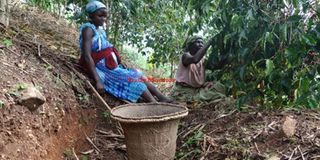Kasese farmers benefit from national park conservation, mountains project

Some members of BJFA picking coffee. Courtesy photo
“Our dream is to produce the best quality coffee in Uganda ” says Matthias Kasighalire as he inspects his coffee plantation with red cherries ready for picking. He proudly points out the special features such as compost pits, and later the association’s small-scale but meticulous processes—pulping, fermenting, washing, among others—which the crop goes through before the market.
He is the marketing manager, Busongora Joint Farmers’ Association (BJFA), a coffee growing community-based organisation. It comprises of farmers from communities neighbouring the Rwenzori Mountains National Park in Maliba and Bugoye sub-counties, Kasese District.
Visit to Sipi
Twelve farmers from BJFA were sponsored by WWF Uganda—World Wide Fund for Nature Uganda—for an exposure visit to learn about Climate Smart Agriculture from farmers in Sipi on the slopes of Mt Elgon, an Arabica coffee growing region.
During the visit, the farmers were guided on good agricultural practices such making trenches, mulching, planting grass and shade trees in their gardens that would reduce soil erosion as well as provide food for them and feed for their animals. Mt Elgon has a similar landscape to the Rwenzori mountains therefore the lessons learned can be easily replicated.
The farmers also learnt about organic manure and pesticides, agroforestry, post-harvest management, value addition and marketing.
To complete the package, they were also trained in nutrition and sanitation with special emphasis on kitchen gardens and proper garbage disposal.
Practicing lessons learned
Sylvia Kibikwamu, who took part in the visit, has drawn a work plan to guide her on how to utilise the knowledge she acquired. She has trained her husband and they have dug trenches, mulched and planted shade trees and lemon grass. She is developing a demo kitchen garden to train other women.
“During the heavy rainy seasons, a lot of soil gets washed away but since we started using the methods we learnt, there are no run-offs anymore and I believe we will get more coffee in the next harvest,” Kibikwamu says.
A quality that makes BJFA unique is their emphasis on family harmony through promotion of children and women’s rights and the fight against domestic violence.
They have made efforts to empower women, which is why women like Kibikwamu can teach their husband and not get resistance, which would be the norm in most rural male-dominated cultures.
During the training, each participant commits to training other members of their community. So far, in three months since the visit, 49 farmers have been trained and are implementing the good practices on their farms.
Challenges
The main challenge for the farmers is climate change. Farmers indicated that dry seasons were longer and the rainy seasons unpredictable.
This affects the flowering stage of coffee which in turn leads to poor yields. Furthermore, certain pests and diseases seem to be increasing especially in low altitudes.
A 2013 research by Oxfam on the impact of climate change on coffee in Uganda found that “climate change will have an impact on the suitability of Arabica coffee growing areas in Uganda, including the Rwenzori Mountains. Most areas will become less suitable, and particularly those at lower altitudes (1500m) will be severely affected”.
Therefore, to manage this, adaptive measures such as planting shade trees will have to be considered.
Receiving a sub grant
Against this backdrop, WWF-Uganda with funding from European Union and French Facility for Global Environment is implementing the “Sustainable Financing of the Rwenzori Mountains National Park” project.
It aims at improved livelihoods for the local communities. BJFA with a membership of 516 (387 females and 129 males) is one of the beneficiaries of this initiative.




